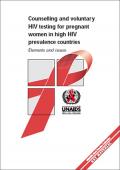Publications - Released in 2001
For many years, little was known about preventing transmission of HIV infection from mother to child. Recently, however, many advances have been made in developing effective and affordable interventions that reduce the likelihood that a woman will pass HIV on to her baby. The two most important interventions—the provision of antiretroviral drugs and the avoidance of breastfeeding—only apply to HIV-positive women. Both therefore require that a woman know whether she is infect- ed by HIV. And yet in developing countries, where 95% of mother-to-child infections take place, there are very few counselling and testing services that allow a woman to find out her HIV status.
The document gives an overview of the magnitude of the problem of HIV transmission from mother to child. It then focuses on the benefits of counselling and voluntary HIV testing in the context of pregnancy, and discusses the content of such counselling. Operational issues and potential difficulties in setting up and maintaining such a service are explored.
Downloads
Organizations
- Joint United Nations Programme on HIV/AIDS (UNAIDS)






